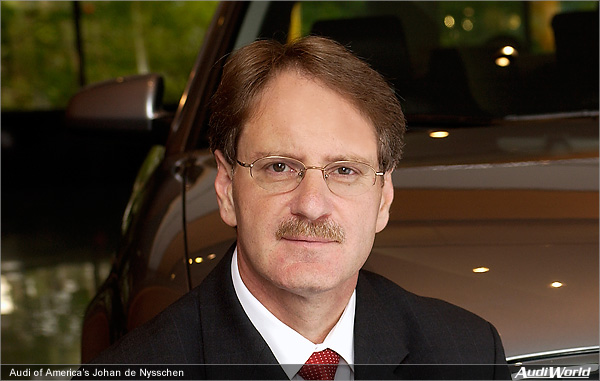AudiWorld Interviews Audi of America Executive VP Johan de Nysschen (Part II)

Last week we published the first in a two part interview with Audi of America Executive VP Johan de Nysschen. Part I, which can be accessed by clicking here covered de Nysschen’s perspective regarding Audi’s participation in motorsports. Readers learned why Audi races, how technology moves from track to street and just how far the bar had been raised with the new R10 TDI racecar. In Part II which follows below we take the interview in a different, yet related, direction to explore Audi’s TDI strategy in North America. Many enthusiasts are clamoring for Audi to offer diesel powered vehicles in the US, however challenges with powerplants, regulations and fuel distribution all stand in the way. This fascinating piece provides new insights into how Audi will approach TDI’s and what to look for in the future. AW: What are the biggest challenges for Audi of America specifically in introducing diesel technology? JdN: It is to overcome the general consumer perceptions of diesel. American consumers according to all the research view diesel engine vehicles as slow, heavy, cumbersome, noisy, smoky and smelly even. When you go to refuel you go around to the truck stops and you have oil on the walkway and when you fill up your tank with the diesel nozzle that fuels at thousands of liters per second and you get fuel all over yourself. So, negative perception. And I have to say this some years ago some of the domestic brands ventured into the domain of diesel engine cars and their reliability reputation was not what we would consider to be benchmark. So its given diesel engine vehicles a bit of a bad rap. All of those are perceptions that have to be overcome. The reality is of course something totally different. The modern, high tech diesel engine is quiet, it is clean burning, it is very economical; it has very beautiful power and torque characteristics. They are performance cars in their own right. But you have to get people to drive them and experience them to believe it. And of course thats a long and slow process to change perceptions and attitudes. We also will have to overcome with certainty the distribution challenges for diesel fuel. And yes we are working very closely with our development partner Shell who is an important partner to us in this project. We want to work together with them to look at overcoming some of the challenges in introducing diesel to the US. Where are the pumps located? The dispensing nozzles? We have to somehow create an environment where the customer doesnt feel like diesel is somehow a truck application and not a private transportation application. AW: So motorsport is the thin edge of the wedge in terms of driving that new perception. How else do you change it? So is the key just getting people into cars? We love driving your TDIs and became believers via that experience. Is it enough to get them into showrooms, or are there other specific steps that youll take. JdN: I would answer your question this way. Being a high end manufacturer, Audi is essentially a small company. We dont do millions and millions of automobiles. It means that our reach is somehow limited. It is defined by where we position ourselves and whom we target. We are not going to be able to conquer the world and to change the perceptions of American consumers about diesels all by ourselves. It will require a concerted effort by all the interested stakeholders in the industry. That is not only ourselves and our direct competitors. We as an industry will have to work together to develop an awareness of the benefits of diesel technology. Regardless of brand or the manufacturer there are benefits to be derived from modern diesel technology. Secondly there is the oil industry which has a vested interest in raising the awareness of the benefits of diesel. Even the oil companies have finite resources, and they need to be also environmentally aware. They have social responsibility to be good corporate citizens, and they behave this way. So that is why you will find Audi and Shell in this case to be really very complimentary partners because share the same objectives we are not competitors. And then there is the supplier industry. I think we all need to work together towards a common goal and have a coordinated, concerted effort to reach the American consumers to bring to them one message. It is not about whether Audi is better than any of our competitors or whether any fuel company is better. It is the generic benefit of what diesel technology can bring. We have to do that first. Once we have reached that level of understanding then you can increase the sophistication by beginning to emphasize the differentiation between brands and carmakers. AW: We always thought of it as if you dont do it, somebody else will but you are saying it is an industry wide initiative and responsibility? JdN: And you have to balance that there are alternative schools of thoughts into hybrids or hydrogen. We belong quite comfortably in the diesel camp. We think that is the solution. For particular applications hybrid technology does have advantages but it only works in very heavy traffic conditions where you have stop/go driving. The moment you get into light suburban driving already diesel clearly has an advantage. And when you get into open road traveling then even gasoline cars have an advantage. Its a no-brainer. Hybrid cars under those circumstances simply are not as fuel efficient. Pages: [1] [2] |
